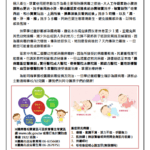In order to reduce the risk of transmission of enterovirus and to prevent the outbreak from affecting the health of young children, school and family life, parents and caregivers of young children are advised to promote the concept of enterovirus prevention, not to go to school when sick, and to wash their hands frequently and correctly, and to stay at home when they are sick, and to avoid going to public places. Caregivers should also be reminded to keep a close eye on the health condition of children with enterovirus and to send them to a major hospital as soon as possible if they show signs of serious illness.
In order to avoid the spread of the epidemic, if two or more (inclusive of two) students in the same class are clinically diagnosed by a doctor to be infected with enterovirus, hand-foot-mouth disease, or herpes pharyngitis in a week, the school (campus) should set up a crisis team in collaboration with the parents' association, and convene the relevant staff, parents, health professionals, etc., to discuss effective countermeasures.
Criteria for Suspension:
(i) Nursery schools:
1. The Disease Control Administration of the Ministry of Health and Welfare announced an epidemic of enterovirus type 71 in the current year: If two or more children in the same class are clinically diagnosed by a dentist to be infected with enterovirus, hand, foot, and mouth disease, or herpes pharyngitis within seven days, the class should be suspended for seven days.
2. No epidemic of enterovirus 71 in the year: In the administrative districts where the Disease Control Administration of the Ministry of Health and Welfare announced that there were "positive cases of enterovirus 71" or "severe cases of enterovirus infection over 3 months old" in the current year, if more than two (including two) children in the same class are clinically diagnosed by a dentist to be infected with enterovirus, hand-foot-mouth disease, or herpes pharyngitis in the current year, the class should be suspended for seven days. The class should be suspended for seven days.
(3) When there is a notified case of serious illness associated with enterovirus infection in the school and enterovirus D type 68 is detected in the case, the class in which the case is enrolled shall be suspended for seven days.
(4) In administrative districts not located in the Disease Control Administration of the Ministry of Health and Welfare where there were "positive cases of enterovirus type 71" or "severe cases of enterovirus infection over three months old" in the current year, if more than two (including two) children in the same class are clinically diagnosed by dentists to be infected with enterovirus, hand-foot-and-mouth disease, or herpes simplex pharyngitis in the same classroom within seven days, the school should call the relevant staff, parents or parent representatives to discuss and obtain the consent of more than one half of the parents in the classroom before taking measures to suspend the classroom, When the school calls relevant staff, parents or parent representatives, and health professionals to hold a meeting and obtains the consent of more than one-half of the parents of the class, then the school can be suspended and the number of days of suspension shall be seven days. When the decision is made to suspend the school, the minutes of the meeting shall be attached and reported to this Bureau for record.
(b) Elementary schools: In principle, there is no need to suspend classes.
However, if one of the conditions of the epidemic in the preceding paragraph exists, and in order to avoid the spread of the epidemic and if it is necessary, the school may suspend classes, and the decision to suspend classes shall be made by the school administration at a meeting with the relevant staff, parents or parent representatives, and health professionals, and, in the case of the situation in the fourth paragraph of the preceding paragraph, the consent of more than one-half of the parents of the class shall be required; and the number of days of the school suspension shall be seven days as the principle. The number of days of suspension shall be seven days in principle. When the decision is made to suspend classes, the minutes of the meeting shall be attached and reported to this Bureau for record.
(c) Junior high schools: In principle, there is no need to suspend classes, and hygiene education and environmental disinfection are the main treatment measures.
(d) The authority and responsibility for suspension of classes and the procedures for resumption of classes:
(The principal of the school decides the date of suspension and resumption of classes. After the suspension of classes is confirmed, the crisis management mechanism will be activated, and a notification will be made to the School Safety Center and the District Supervisor will be notified immediately. During the suspension period, in order to prevent other children from becoming infected, please ensure that the classrooms and campus environment are cleaned and disinfected, and that the treatment of children in the suspended classroom and the health of other children are tracked on a daily basis.
(b) Procedures for resumption of classes: Classes should be resumed when the reason for the suspension disappears. In order to protect the rights and interests of students, after the principal decides on the date of suspension and resumption of classes, the kindergarten section does not need to make up the classes but has to refund the fees in accordance with the relevant regulations; the other section of the elementary school should be reported to this Bureau in an official letter with a make-up plan, and refunds of lunch fees during the period of suspension should be made in accordance with the relevant regulations.
Text/ Municipal Education Bureau, Division of Student Guidance and Counseling




